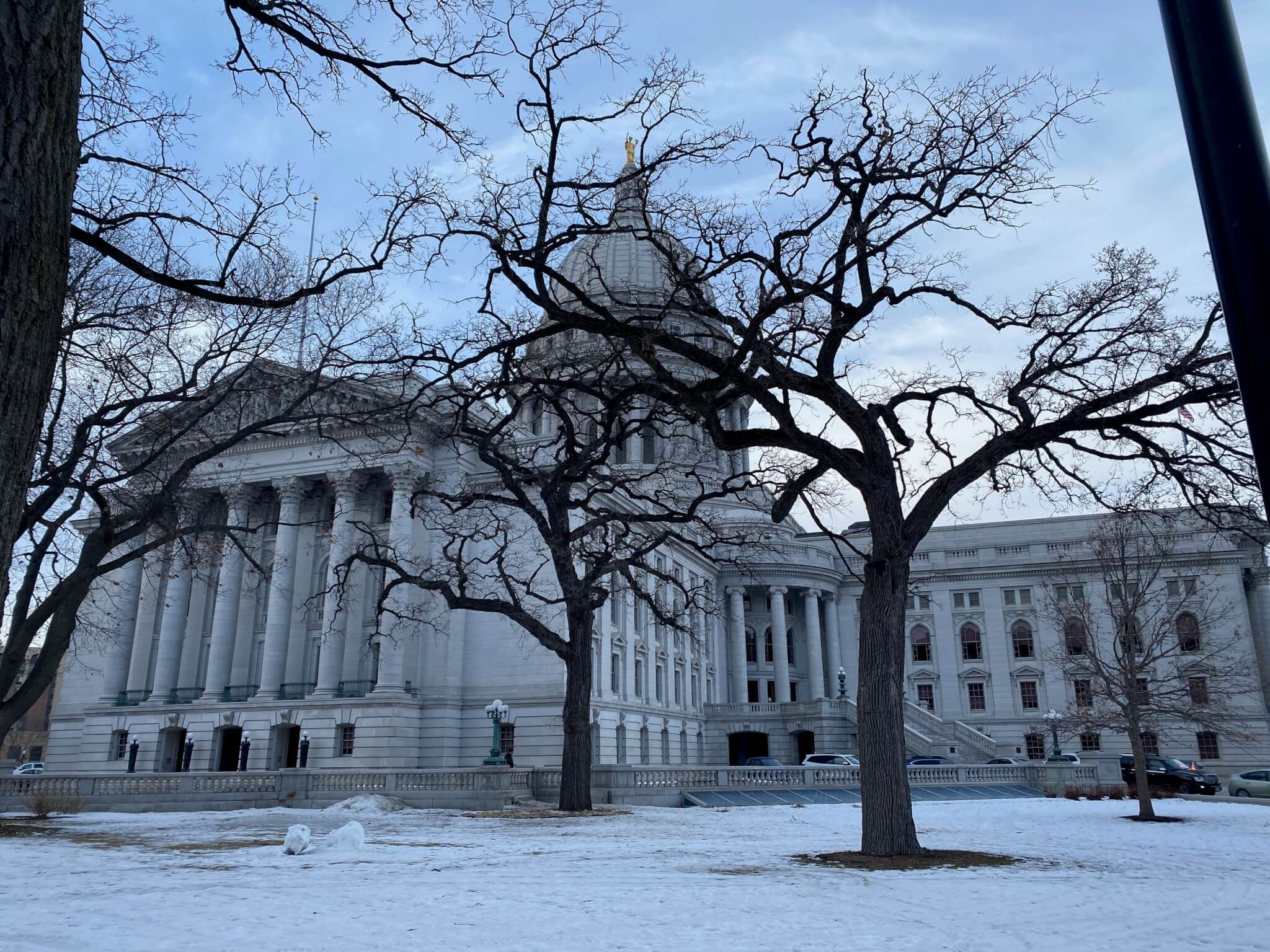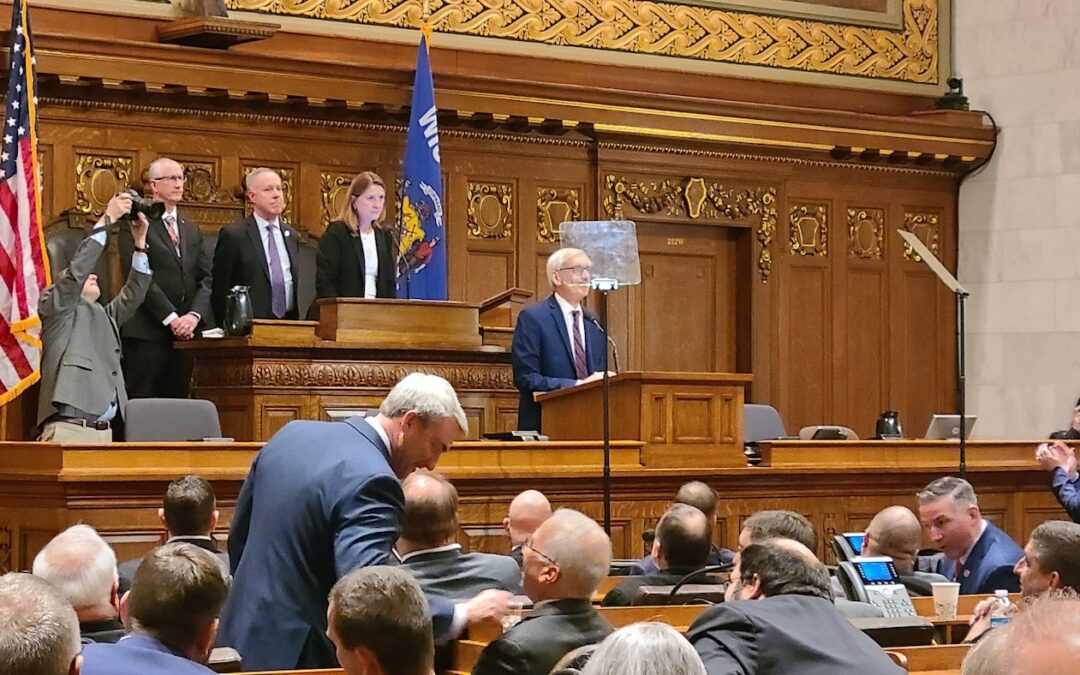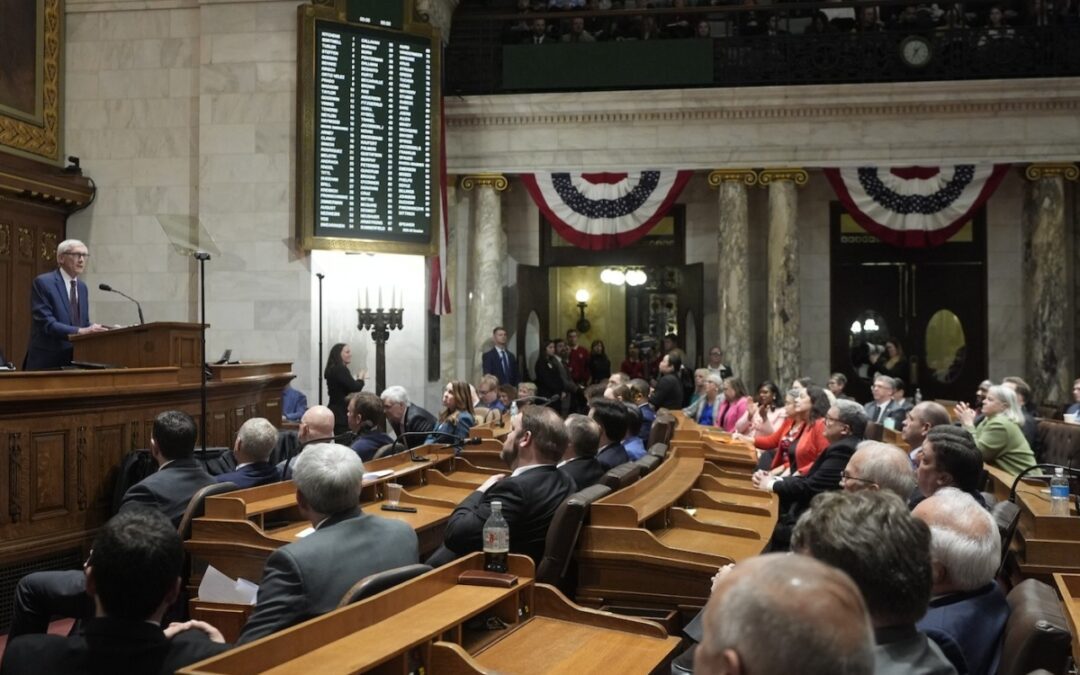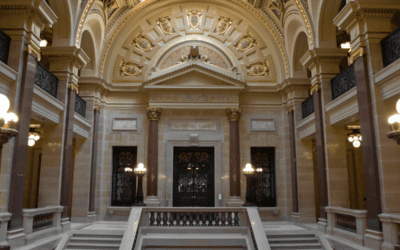
Gnarled branches obscure the view of the Wisconsin state Capitol in Madison on Feb. 8, 2022. (Photo by Pat Kreitlow)
Most people, no matter how much they disagree, would find a way to divide a $4 billion pot in ways to make everyone happy. Political gamesmanship has prevented bipartisan progress in the Assembly and Senate.
It’s a question unique to politics, one that likely wouldn’t be asked in any other condition: Can a group of people with different priorities still find a way to divide $4 billion and make almost everyone happy?
The Wisconsin Legislature, heading into a 15th year under Republican control, has struggled to achieve a “win-win” deal with Democratic Gov. Tony Evers during his first three biennial budget cycles—not entirely a surprise given that Republicans have begun their part of the state budget process each time by zeroing out Evers’ requests, writing their own document, daring Evers to veto the final product, and calling Evers divisive when he uses his line-item veto powers to remove some of their priorities.
Will the fourth time be a charm for partisan harmony—especially with a current estimated state surplus of $4 billion? Perhaps not with an entire budget bill, but Republican and Democratic lawmakers could start by agreeing on two items: a well-rounded tax cut and some overdue relief for school districts’ special education costs.
The sticking point for a bipartisan tax cut seems to center on a six-figure income. Evers has vetoed past Republican packages for giving the bulk of its proposed benefits to filers making more than $100,000—while ignoring the governor’s plans that would have targeted relief to filers making annual incomes under $100,000.
As in all budget debates, there will be struggles to find bipartisan consensus on spending for public schools and higher education—but some education advocates are pointing to one glaring disparity they hope Republicans will want to make less obvious. The state provides aid to public school districts to help offset 33 percent of special education costs—while private schools in voucher programs are reimbursed for 90 percent of those costs.
Tax cuts and special education are only two of the many fights, votes, and decisions to come. State Superintendent of Public Instruction Jill Underly has outlined a request for an additional $4 billion in the next budget. The Universities of Wisconsin (formerly the UW System) plans to seek an additional $855 million. The Wisconsin Technical College System is requesting an additional $45 million. And advocates for childcare providers and parents say the Legislature should spend an additional $2 billion to boost providers’ wages and make affordable quality care more accessible.
Evers will reveal his budget priorities during an address to the Legislature in February. Democratic legislators have recently outlined their own budget priorities that in addition to education funding and a middle class tax cut include accepting federal Medicaid funds to strengthen BadgerCare and extending BadgerCare coverage to new moms for a longer period after babies are born, boosting financial support for childcare, and protecting drinking water.
Even as the 2025-26 budget preparation starts, there remain several pots of money unspent from the current budget, held up by Republican legislators seeking to extract concessions from Evers. Despite being approved by the Legislature and signed by Evers, Republicans have refused to release $125 million to clean up drinking water contaminated with PFAS industrial chemicals, $50 million to implement new literacy efforts that legislators mandates, and $10 million to address healthcare challenges after the closure of two hospitals in the Chippewa Valley.
Support Our Cause
Thank you for taking the time to read our work. Before you go, we hope you'll consider supporting our values-driven journalism, which has always strived to make clear what's really at stake for Wisconsinites and our future.
Since day one, our goal here at UpNorthNews has always been to empower people across the state with fact-based news and information. We believe that when people are armed with knowledge about what's happening in their local, state, and federal governments—including who is working on their behalf and who is actively trying to block efforts aimed at improving the daily lives of Wisconsin families—they will be inspired to become civically engaged.


Evers: ‘I’m excited to be introducing the most pro-kid budget in state history’
The Wisconsin governor’s 2025 state budget address details his funding priorities, including measures to eliminate taxes on tips and...

Evers’ State of the State Focus: Make 2025 the ‘Year of the Kid’
Republican leaders promptly and insultingly dismiss the governor's priorities and pledge to pursue more tax cuts and support President Trump's...

The deaths of two former state senators remind us of a less partisan Wisconsin Legislature
Republican George Petak was kicked out of office for supporting a tax that funded a new Brewers stadium. Democrat Tim Cullen joined a Republican...

Opinion: Celebrating this year’s wins and building momentum for 2025
A Better Wisconsin Together celebrates the victories of 2024—from fair maps to workers’ rights and reproductive freedom—and now they’re gearing up...





